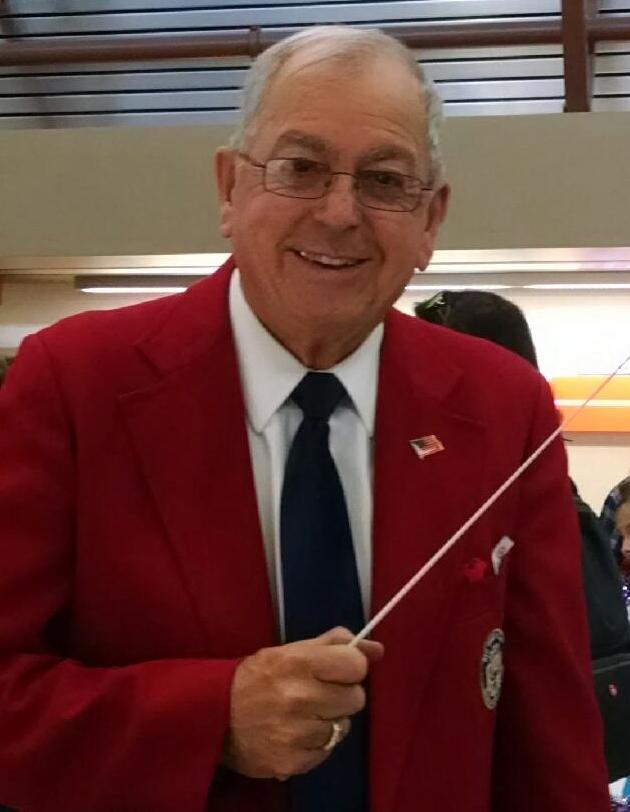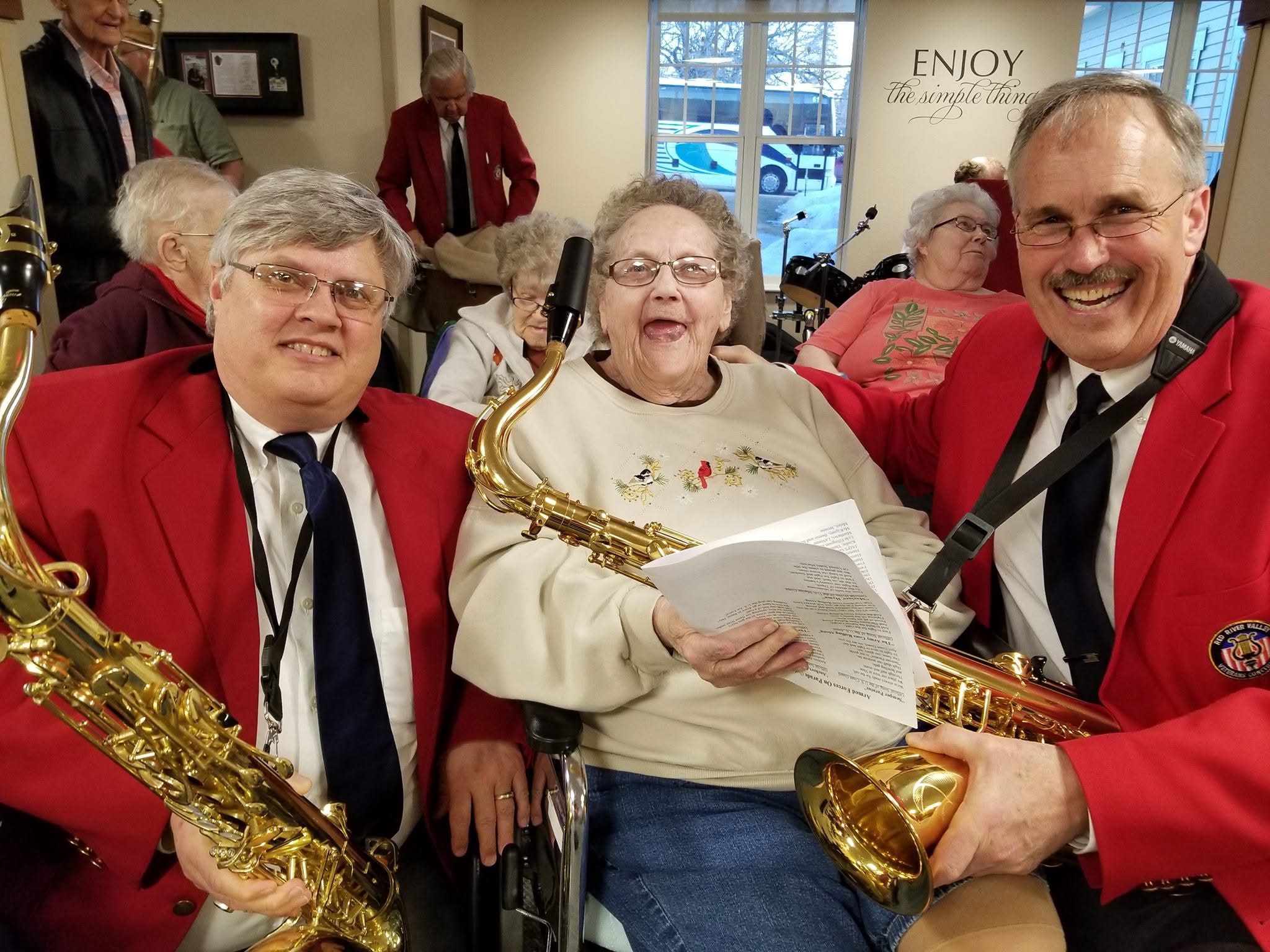
Bernie McKigney, who recently retired as an RRVVCB director, is still playing after 53 years in the band.

RRVVCB tenor sax players Jeff Puhalla and Brad Schmidt with care center resident Donna, who also played tenor sax in a band!
Inspiring audiences for half a century
By Michael Stein
Music has been an integral part of military institutions since long before the American Revolution when American patriot soldiers mockingly sung “Yankee Doodle” to the British redcoats after a victorious battle. More than a century later, American composer and military veteran John Philip Sousa incorporated the Yankee Doodle tune in his march “America First.”
Another century later, Sousa’s music is carried on by patriotic music ensembles throughout the country. One of those, the Red River Valley Veterans Concert Band, has been inspiring its concert goers for more than 50 years.
“The band started back in the mid-1940s when many veterans were coming home from the war and wanted to continue performing,” said Brad Schmidt, long-time tenor saxophone player and scheduling coordinator, “It was originally called the Legion Post 2 Band. At that time, it was all guys, but it grew as more musicians joined.”
The band’s current name has been in place since 1997.
“We’ve grown to where we now have 62 members with around 45, on average, playing a concert any time from September 1 to May 30,” Schmidt said. “We might do a couple concerts in June, but otherwise we gather every Thursday evening whether it’s a practice or a concert.”
Of course, prime concert days are Veteran’s Day, with up to five events at various venues, and Memorial Day, which includes two cemetery programs, one being at the Fargo National Veterans Cemetery.
The band also has strong ties with the area’s Honor Flight homecomings. “We play for all the welcome-home events of the North Dakota/Minnesota Honor Flights at Hector Airport,” Schmidt said. “First we play a selection of prelude music for veterans’ families as they’re waiting and then a military service song medley (Coast Guard, Army, Marine, Navy, Air Force, and Space Force) when the veterans arrive. It’s very emotional for them as they are cheered by the crowd and hear the music.”
All the band members are volunteers who believe in donating their time to music. “And our mission, promoting patriotism through music, has remained constant throughout,” Schmidt said. “Veterans are our heroes. The band takes pride in performing at care centers and veteran’s hospitals throughout the region. We love to go to those places where the residents wouldn’t otherwise be able to get out and see a full band performance.”
Many of the band members are also area educators, a third of the musicians are veterans, and most have veterans in their families. The majority are from the Fargo-Moorhead area, but some come from as far as 50 miles away. The age range is pretty wide—anywhere from players in their early 20s to a woodwind player, Em Laskey, who is still going strong at 94.
Laskey joined the group 45 years ago when it was still the Legion 2 Band. She broke a barrier in the process. “I was the first woman allowed into the band,” Laskey said. “I just wanted a place to play music. At first there were a few guys who resisted having a woman in the band, but they later came around, and I think overall it’s made a big difference. I was happy to be able to play somewhere.”
Laskey has been making music since taking piano lessons at age seven and learning the flute at nine. A registered medical technician after college, she worked for her late husband’s business, Northwest Equipment, and piloted the company plane.
“Music has always been important to me,” she said. “I sometimes think I should have majored in music, but I wasn’t interested in teaching. I still play for chapel services at Touchmark (retirement community); I’ve played in the Lake Agassiz Wind Symphony and the Metro Community Band, and I was the first woman to play in the Elks Band, Shrine Circus Band, and the North Dakota State Legion Band.”
Although younger than Laskey, 82-year-old Bernie McKigney has the longest tenure in the band at 53 years. “I go way back to the Post 2 Legion band after getting out of the Army in October 1972,” McKigney said. “I was a music teacher until I was drafted and served in the infantry in Vietnam. Then I started playing in Army bands.”
Once out of the service, McKigney discovered the American Legion had its own band. “While teaching I played several instruments. But I’ve stuck with playing sax or clarinet. I love playing music for veterans in the community. It’s a gift I have, and I want to give something back. My philosophy is if you love doing something, don’t suppress it whether it’s music, a sport, or a hobby.”
After teaching in Pelican Rapids and Middle River in Minnesota, McKigney left academics and became a technician for the 188th Army Band of North Dakota National Guard in 1978. He later went full time with the Guard performing a variety of duties. He still directs the 9th District Legion Band in Minnesota.
Two RRVVCB directors lead the band: Aaron Romaine, a former music director, and Keith Wander, a retired music educator of more than 40 years. Romaine takes the first half of the program year, Wander the second half.
“Another fun part of the band is that we play a wide variety of music,” Schmidt said. “From Sousa to show tunes, movie themes, polkas, waltzes, and songs of reverence. And it’s amazing to see what those tunes do for people in our audiences—the emotions and memories the music evokes for them.”
There are times when the moments are nearly miraculous. After playing at a memory care unit, Schmidt related: “We were hauling our gear out and a family came up and thanked us for a very special moment. While we were playing a song, their mother, who was non-communicative, started singing along and clapping to the tune. They told us, ‘We haven’t heard her speak in a long time.’ While playing “America the Beautiful at the North Dakota Veterans Home in Lisbon, a veteran with only one leg was so moved that he stood up, refusing help from nursing staff, and saluted the band as we played.”
There are virtually no living World War II veterans in the area and very few Korean War vets. Schmidt said most veterans in their audiences are from the Vietnam era. “They did not have a welcoming experience when they returned. And overall, it was a bad experience. Now people are cheering as we play for them, and that’s a great feeling.”
The RRVVCB partners with—and has members playing in—other groups in the community, such as the El Zagel and Shrine Circus bands. Those partnerships help with growth and awareness.
“We’re always looking for new members and we’re getting more requests for concerts,” Schmidt said. “We play in lots of care centers and in public venues. Recently, we’ve played in schools where the kids join us in some of the songs. We hope we can inspire young musicians in the process.”
Despite the band’s longevity, there have been challenges. “The pandemic had a huge effect on the band,” Schmidt said. “But now we are getting out there playing concerts and getting recognition. We also owe a lot to being part of Giving Hearts Day since 2018. Before that our financial situation was month to month with most funding coming from the veterans’ clubs and gaming sites. Giving Hearts Day was a game changer for us. Through that association we’ve gotten some nice donations.”
As a charitable organization, the band is completely funded by donations from individuals, businesses, and various organizations. The public benefits from that support because all RRVVCB concerts are free and open to all.
When he started with the Legion 2 Post band, McKigney said the musicianship wasn’t nearly as good as it is today. “I’ve seen a lot of changes over the years,” he said. “I was part of the transition to bringing women into the group, which has made a big improvement. We’ve added instruments, and we’re out more in the community. Although we still focus on doing all kinds of patriotic songs, we play more popular and lighter styles of music as well.”
Schmidt said local media have been great supporters for the band, which also splits off into two smaller groups of about 15 musicians each playing as Dixieland and Swing bands.
“It’s all for the love of music,” he said. “We have people from nearly every vocation, from teachers to engineers to plumbers and medical professionals. We’ve really become like a family; we help each other when someone is hurting, and we celebrate together.”
“We have a good following and a good reputation,” McKigney added. “We play more popular and lighter styles of music as well. When we play retirement homes we try to play the tunes they grew up with and have pleasant memories for them. That’s especially true for the veterans. It’s a good feeling for a musician. Our concerts are really appreciated by the audiences, so we must be doing something right.”
Lieutenant Commander Sousa would be very proud.

